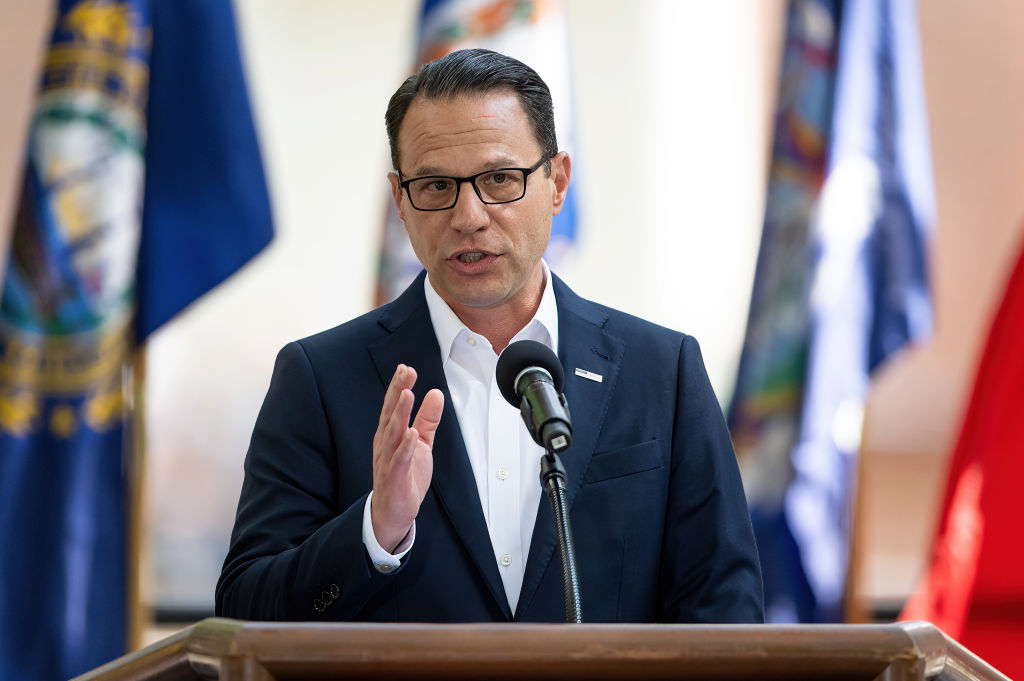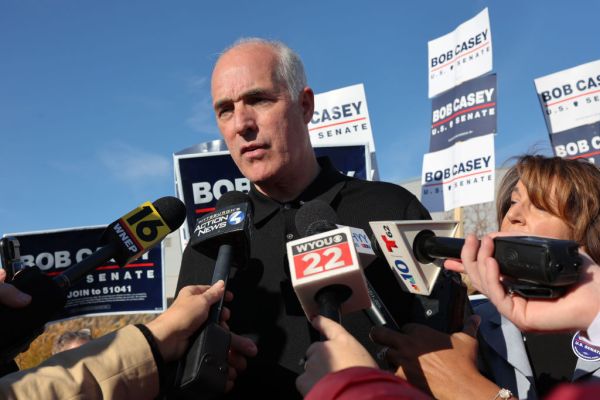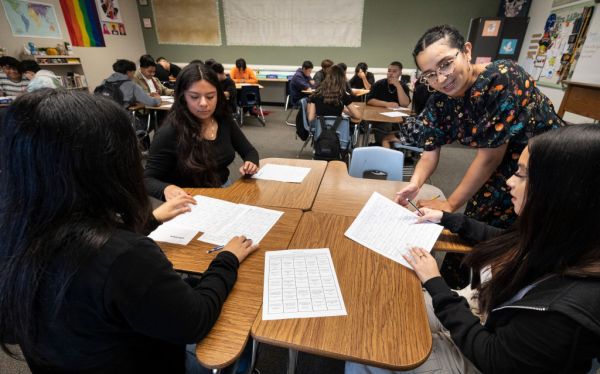Happy Wednesday! It took him about two months and several botched attempts, but a hearty congratulations to GOP Sen. Tommy Tuberville of Alabama for finally saying these words in this order: “White nationalists are racists.”
Quick Hits: Today’s Top Stories
- NATO Secretary-General Jens Soltenberg announced Tuesday that NATO won’t require Ukraine to fulfill a “Membership Action Plan”—a potentially multi-year slate of military reforms and other conditions—to join the alliance, but didn’t offer a timeline for membership and said Ukraine will be invited only “when allies agree and conditions are met.” Meanwhile, U.S. National Security Adviser Jake Sullivan said the U.S. intends to sell F-16 fighter jets to Turkey, pending congressional approval. The announcement came shortly after Turkey dropped its opposition to Sweden’s NATO accession, though Sullivan resisted connecting the two steps.
- The U.S. Treasury Department imposed sanctions on Tuesday against Serbian spy chief Aleksander Vulin, accusing him of “corrupt and destabilizing acts” including illegal arms shipments, drug trafficking, and support for Russia’s efforts to undermine stability in the Western Balkans. Vulin served as Serbia’s interior and defense minister before becoming spy chief in December, and has led the country in its refusal to join Western sanctions against Russia.
- Two 26-member grand jury panels were chosen in Atlanta on Tuesday, one of which is likely to decide whether to issue indictments in Fulton County District Attorney Fani Willis’ investigation into former President Donald Trump’s efforts to overturn the 2020 presidential election results in the state.
- The Department of Justice said in a court filing Tuesday that Trump was not acting within the scope of his job in making comments about writer E. Jean Carroll while president—and so should not be immune from personal liability in her defamation lawsuit. A jury has already found Trump liable for sexual abuse and defamation related to remarks he made after his presidency, but the Justice Department’s reversal will allow a second defamation lawsuit from Carroll—related to comments Trump made while president in 2019—to proceed.
- A federal judge on Tuesday rejected the Federal Trade Commission’s efforts to block Microsoft’s acquisition of video game publisher Activision Blizzard, ruling the $69 billion purchase could move forward. The court said the FTC—which, under Chair Lina Khan, has made policing Big Tech one of its signature issues—had failed to show evidence the merger would reduce competition in the video game industry. With the U.S. obstacle out of the way, Microsoft has agreed to pause its legal battle with the United Kingdom’s Competition and Markets Authority to continue negotiations to satisfy the U.K. regulator.
- Heavy rains across the northeast this week caused significant flooding in New York’s Hudson Valley and Vermont, closing the downtown area of Vermont’s capital, Montpelier, and killing at least one person. Some parts of New York saw twice as much rain in a day than is typical in the entire month of July. More rain is expected throughout the week.
Pennsylvania Teachers’ Unions Flex Their Muscle

Josh Shapiro staked out a bold position for a Democrat as he was running for governor in Pennsylvania last year. “Josh believes parents deserve to be empowered to ensure their kids receive a good education and that every child has access to quality learning,” his campaign website read. “[He] favors adding choices for parents and educational opportunity for students and funding lifeline scholarships like those approved in other states and introduced in Pennsylvania.”
School voucher programs—even targeted ones like the Lifeline Scholarships Shapiro’s website was referencing—are anathema to the teachers’ unions that hold an inordinate amount of sway in Democratic politics. But Shapiro backed them anyway on his way to a 15-point victory over the Trump-aligned Republican Doug Mastriano last fall. “I’m for fully funding public education,” he told reporters in September. “I’m for making sure we give parents the ability [to] put their kids in the best situation for them to be able to succeed.”
A 50-year-old former attorney general with bipartisan appeal, Shapiro began receiving presidential plaudits within days of being sworn into office as governor of the swing state. His first few months on the job—during which he eliminated college-degree requirements for thousands of government roles and oversaw a widely praised response to the collapse and rebuilding of a stretch of highway—did little to dampen that image, as he maintained a +34 net approval rating in late June. But his decision last week to abandon the school voucher program he championed in the face of Democratic opposition could leave a mark.
As recently as July 3, Shapiro’s administration was voicing its approval for the Pennsylvania Award for Student Success (PASS) vouchers, pushing for their inclusion in the state’s annual budget as long as they didn’t detract from public school funding. “I believe every child of God deserves a shot here in the Commonwealth of Pennsylvania, and one of the best ways we can guarantee their success is making sure every child has a quality education,” Shapiro told Fox News host Dana Perino earlier this summer, asked about the voucher program. “I’ve been very clear that I’m open to that concept that you described a moment ago, but I’ve also made crystal clear that I won’t take a dollar out of our public schools in order to achieve that.”
The decision, however, wasn’t his alone. Although Pennsylvania’s Republican-controlled Senate voted 29-21 on June 30 to pass a roughly $45 billion budget that included $100 million for the school vouchers, the Democratic-controlled House made clear the proposal was dead on arrival. Rather than enter into a protracted battle with his own party over a budget that was already several days late, Shapiro caved. “Knowing that the two chambers will not reach consensus at this time to enact PASS, and unwilling to hold up our entire budget process over this issue,” he said last week, “I will line-item veto the full $100 million appropriation and it will not be part of this budget bill.”
Senate Republicans—who negotiated the details of the plan with Shapiro’s office and agreed to several Democratic priorities in exchange for its inclusion—were not pleased. “Governor Shapiro has decided to betray the good faith agreement we reached, leaving tens of thousands of children across Pennsylvania in failing schools,” GOP state Sens. Kim Ward, Joe Pittman, and Scott Martin said in a joint statement. “It is a shame the governor does not have enough respect and standing within his own party to follow through with his promise.”
If enacted, the PASS program would’ve allocated $100 million to be doled out in the form of vouchers to families living in areas served by the state’s worst-performing public schools. On a first-come, first-serve basis, students in half-day kindergarten would receive $2,500 per year that could be put toward tuition or fees at a nonpublic school, while students in full-day kindergarten through eighth grade would receive $5,000 per year, high schoolers would receive $10,000 per year, and students with special needs (of any age) would receive $15,000 per year. Only families making less than 250 percent of federal poverty guidelines would be eligible for the vouchers.
The initiative was driven largely by conservative advocacy organizations like Commonwealth Partners, but not exclusively so. Meek Mill, a rapper and activist who grew up in Philadelphia, signed onto an open letter supporting the voucher program, and Democratic state Sen. Anthony Williams—who represents parts of Philadelphia—voted with Republicans to include it in the state’s budget. “Those of us who believe that there’s a space for public education also have a right to make sure that the public education system is accountable and is working to its highest maximum possibility for students,” Williams tells TMD. “If it’s not, you got to call it into account. And part of that is creating other options for parents to make decisions about what’s in the interest of their child.” Philadelphia’s public schools routinely rank among the worst-performing in the country.
Pennsylvania State Education Association (PSEA) President Rich Askey is hoping additional money—the state’s budget increases public school funding by more than $700 million—will improve outcomes without the need for vouchers. “We’re grateful that lawmakers have approved a state budget that makes much-needed investments in our public schools. It is important to recognize that the funding increases in this budget are only a down payment on a long-term fix to our unconstitutional public school funding system,” the union leader wrote, referencing a Commonwealth Court decision from earlier this year that found Pennsylvania schools weren’t equipped to properly educate all their students. In late June, a coalition of teachers’ unions—including PSEA—wrote an open letter opposing the $100 million voucher program, calling it “unacceptable” and “irresponsible” to “appropriate state funds for tuition vouchers that benefit private and religious schools when the commonwealth hasn’t met its most basic duty to students who attend our public schools.”
The school-choice movement has gained significant momentum in Republican-led states in recent years, buoyed by public schools’ handling of the COVID-19 pandemic, concerns among conservative parents about curricula, and the Supreme Court’s 2022 decision in Carson v. Makin, which held that states can’t exclude religious schools from tuition-assistance programs.
When it comes to assessing the efficacy of school-choice programs, the results are mixed—and unsurprisingly depend on the parameters and execution of any given initiative. Several meta-analyses have found “small positive effects of competition on student achievement” when aggregating data from studies on school-choice programs, while other investigations into some state programs have yielded no significant impact on test scores. When it comes to public opinion, responses often vary depending on how the question is worded, but in all more people tend to favor school choice than oppose it—with black and Hispanic respondents particularly enthusiastic.
The research does, however, approach something resembling a consensus on the question of parental satisfaction: Families who can opt for private education tend to be more satisfied with their child’s school. “There’s a lot of reasons why parents are choosing private schools for their kids, and not all those things can be captured by a standardized test,” Corey DeAngelis, a senior fellow at the American Federation for Children and executive director at Educational Freedom Institute, tells TMD. “So when you’re seeing these large positive effects on things like safety and satisfaction, I think those are better metrics of success, particularly when parents are choosing based on a whole host of different factors that go into what they perceive as school quality.”
Back in Pennsylvania, Shapiro expressed hope that the PASS program is not dead for good, saying Democratic Majority Leader Matthew Bradford promised him he would “carefully examine and consider additional education options” in the future. Republicans lawmakers aren’t holding their breath. “How do we trust anything that anybody says in this body?” one asked on the House floor after Shapiro reneged on his agreement. But Williams, the Philadelphia Democrat, remains hopeful.
“As far as the Democrats I know and have talked to, I think they’re still willing to consider it,” he tells TMD. “I don’t think it was as close as people made it seem. I think it just got messed up in its execution.”
Worth Your Time
- In the Washington Post, legendary sports writer Sally Jenkins tells the story of how tennis icons Chris Evert and Martina Navratilova went from bitter rivals to the closest of friends. “They have known each other for 50 years now, outlasting most marriages,” Jenkins writes. “Aside from blood kin, Navratilova points out, ‘I’ve known Chris longer than anybody else in my life, and so it is for her.’ Lately, they have never been closer—a fact they refuse to cheapen with sentimentality. ‘It’s been up and down, the friendship,’ Evert says. At the ages of 68 and 66, respectively, Evert and Navratilova have found themselves more intertwined than ever, by an unwelcome factor. You want to meet an opponent who draws you nearer in mutual understanding? Try having cancer at the same time.”
Presented Without Comment
Associated Press: Supreme Court Justice Sotomayor’s staff prodded colleges and libraries to buy her books
Also Presented Without Comment
Democratic Sen. Mark Warner to Reuters on stalled efforts to ban TikTok: “I will grant TikTok this—they spent $100 million in lobbying and slowed a bit of our momentum.”
Toeing the Company Line
- Is the Supreme Court actually about to side with domestic abusers? Is Mike Pence the most interesting presidential candidate in the Republican primary? Can Mitch McConnell stop Republicans from nominating sure-fire losers in 2024? Declan was joined by Kevin, Mike, and Audrey to discuss all that and more on last night’s Dispatch Live (🔒). Members who missed the conversation can catch a rerun—either video or audio-only—by clicking here.
- In the newsletters: Sarah makes the case (🔒) for ignoring issue polling on the Supreme Court’s affirmative action decision, the Uphill crew covers lawmakers’ reactions to cluster munitions transfers to Ukraine, and Nick bemoans (🔒)—and chuckles at—Vivek Ramaswamy’s newfound momentum.
- On the podcasts: Jonah is joined on The Remnant by Shawn Bushway of the RAND Corporation to discuss the latest crime trends.
- On the site today: Brian Riedl warns of Washington’s soaring interest costs, Jonah weighs in on the cluster munitions debate, and Mike catches up with Pence on the campaign trail in Sioux City, Iowa.
Let Us Know
What do you think about Gov. Shapiro’s decision to veto his own school-choice plan?











Please note that we at The Dispatch hold ourselves, our work, and our commenters to a higher standard than other places on the internet. We welcome comments that foster genuine debate or discussion—including comments critical of us or our work—but responses that include ad hominem attacks on fellow Dispatch members or are intended to stoke fear and anger may be moderated.
You are currently using a limited time guest pass and do not have access to commenting. Consider subscribing to join the conversation.
With your membership, you only have the ability to comment on The Morning Dispatch articles. Consider upgrading to join the conversation everywhere.